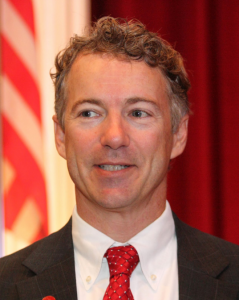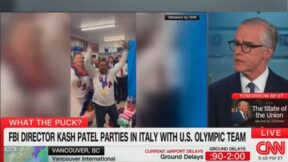Rand Paul: Baby’s First Spin Cycle, Carried Forward
 Rand Paul has had a big week. A week ago today, he won the Kentucky GOP Senate primary and was hailed as a Tea Party success story, promising that he had “come to take our government back.” The next day, we got an inkling as to how he’d do it when it was revealed that he’d challenged the 1964 Civil Rights Act provision that outlawed segregation by privately-owned businesses.
Rand Paul has had a big week. A week ago today, he won the Kentucky GOP Senate primary and was hailed as a Tea Party success story, promising that he had “come to take our government back.” The next day, we got an inkling as to how he’d do it when it was revealed that he’d challenged the 1964 Civil Rights Act provision that outlawed segregation by privately-owned businesses.
Boom – a hot-button news story was born. Paul went from Tea-Party triumph and national up-and-comer to dude with scary backward views that bumped the Tea Party back to not-ready-for-prime-time status rather than ushering it into the limelight of the mainstream political conversation. He couldn’t say whether he thought the Woolworth’s lunch counter should be segregated or not. He needed a day to come out with an amended statement (“I unequivocally state that I will not support any efforts to repeal the Civil Rights Act of 1964”) and needed Karl Rove to yank him from going on Meet The Press.
A week later, and it’s all different. And, as I noted in my column yesterday on AOL News, it’s sort of a shame — because Rand Paul will never make this mistake again:
On Tuesday, Paul was a political newbie, which meant he hadn’t yet learned how to parse, frame, equivocate, dissemble or generally speak like a politician. And when he challenged provisions of the 1964 Civil Rights Act, he meant it. We know he meant it because he said so clearly, both in the interview with the Louisville Courier-Journal that started the whole thing and at the beginning of the Maddow interview, before he realized just what kind of hole he’d dug himself into.
Whatever he says now — and from now on — will never be as honest.
Paul learned the hard way that when your views are repugnant, you have to cloak them in prettifying buzzwords, like “freedom” and “patriotism,” and blame the “liberal media” whenever you get called out.
Which makes him….a mainstream candidate! A lot has been written about Rand Paul this week, obviously, and what his candidacy now means for the Tea Party, both before The Gaffe and after. I found this take from Jason Zengerle in New York interesting:
Until Paul’s [victory] speech, the first rule of the tea party was don’t talk about the tea party—at least not if you were a politician who wanted to win the vote of anyone who doesn’t DVR Glenn Beck and own multiple copies of Going Rogue. The best way for a candidate to court tea-partyers, the theory went, was with a dog whistle, not a bullhorn, lest the candidate alienate non-tea-partyers…But Paul’s Senate candidacy will likely change that. That’s because he seems less interested in representing Kentucky in the United States Senate than in representing the tea party to the United States. “People are already saying, Now you need to weave and dodge, now you need to switch, now you need to give up your conservative message, you need to become a moderate, you need to give up the tea party, you need to distance yourself,” Paul said in his victory speech to a chorus of boos. “The tea-party message is not a radical message, it’s not an extreme message.”
A week ago, that might have been true. Now, I’m not so sure. I think the dog whistle approach is alive and well in Tea Party politics, much more so after Rand Paul’s big week — where weaving and dodging became essential, thanks to Rachel Maddow’s tough questioning. Here’s how Frank Rich characterized it this past Sunday:
Now, after months of debate about what this movement is and isn’t, Paul’s victory provides clear-cut answers.
The Tea Party is not merely an inchoate expression of a political mood, or an amorphous ragtag band of diverse elements, or a bipartisan cry of dissatisfaction with the supposed “government takeover” of health care. The Tea Party is a right-wing populist movement with a specific ideology. It resides in the aging white base of the Republican Party and wants to purge that party of leaders who veer from its dogma.
This is where the tensions of the next few months will lie: in the Tea Party’s power thanks to the “enthusiasm gap” between them and everyone else, and the fact that at the end of the day, they are more extreme and thus remain on the outskirts. Unless, of course, they work on their message.
Which brings us back to Rand Paul’s first spin cycle. He’s not a senator yet – he’s got an election to win, still, which means he’s got voters to convince. The time-tested strategy of running to the middle is the inevitable destiny of the Tea Partiers, who will realize that getting elected is a lot more fun. So however clear and specific the ideology, as Rich notes, the delivery of the message is about to become a lot more nuanced, with code words and parsing and framing and the liberal media blame game.
Rand Paul has five months to make himself seem reasonable. And electable – and that goes double for the Tea Party. Will he do it with a bullhorn? No way – he’s learned the lessons of this week, but more importantly, everyone around him has, too. There will be weaving and dodging, parsing and framing.
But listen up for that dog whistle. It’ll be there.
This is an opinion piece. The views expressed in this article are those of just the author.
New: The Mediaite One-Sheet "Newsletter of Newsletters"
Your daily summary and analysis of what the many, many media newsletters are saying and reporting. Subscribe now!






Comments
↓ Scroll down for comments ↓